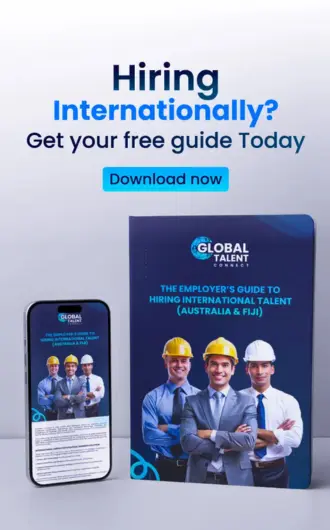Reasons to work in Australia as a foreigner stands as a premier concern for individuals seeking to relocate. With high rankings on the UN Human Development Index, the country offers exceptional access to education, impressive life expectancy, and notable socio-economic progress.
The country has a high employment rate, with 73% of Australians aged 15 to 64 in paid employment, and offers an average income well above the OECD average. Despite its booming economy, Australia faces a notable skills shortage, which the government addresses by inviting skilled foreign workers through various visa programs. Impressively, 80% of skilled migrants find employment within four months of arriving.
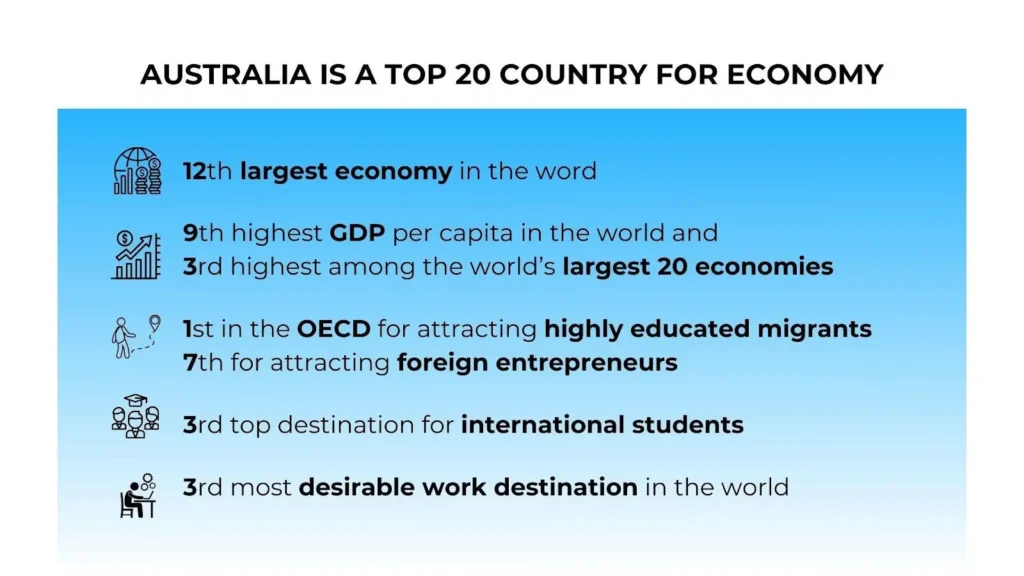
Choosing to work in Australia for foreign nationals isn’t just about job prospects; it’s about embracing a quality lifestyle that many dream of. With a transparent immigration policy and a range of work visa options, Australia’s work opportunity welcomes international professionals and students. In this article, we explore compelling reasons to work in Australia as a foreigner, each one a step towards personal and professional growth, enhanced by the diverse work visa opportunities available.
Strong Economy
The reasons to work in Australia as a foreigner boasts one of the world’s most robust and stable economies. In 2022, while the global GDP per capita was about 12,647 USD, Australia’s GDP was an impressive USD 1.693 trillion, or USD 65,100 per person. This places Australia as the twelfth largest economy globally. From 2019 to 2024, Australia’s economy grew by 11.1%, outpacing other advanced economies, which averaged 7.8% growth. This growth rate is comparable to the US and significantly higher than the European Union and the UK.
Additionally, the country’s job prospects in Australia for internationals remain strong, with 388,800 job vacancies in 2024 and cities like Cairns, Gold Coast, Canberra, and Melbourne offering the most opportunities. It has a low unemployment rate of just 5% and offers excellent minimum wages, even for temporary workers. Despite a slight rise in the unemployment rate to 3.9% in November 2023, the labor market remains strong, supported by wage growth and increased minimum salaries for temporary Australia skilled migration workers.
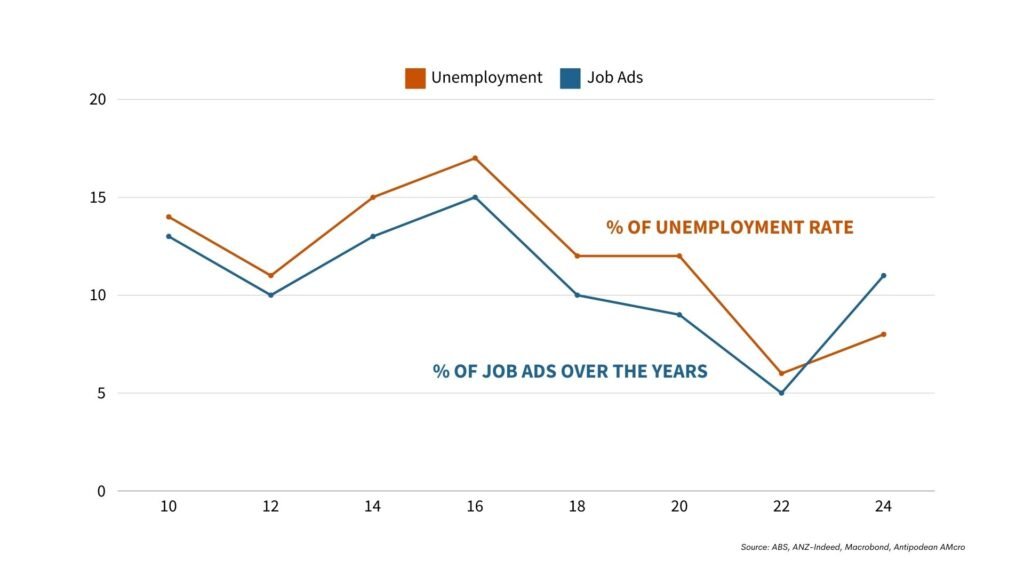
Looking ahead to 2029, employment opportunities in Australia are expected to continue their strong performance, thanks to solid export partnerships with India, China, and ASEAN countries. With an economic freedom score of 76.2, ranking 13th globally and 4th in the Asia-Pacific, Australia demonstrates a strong commitment to open-market policies, rule of law, and entrepreneurship. For international workers, these factors make living and working in Australia an attractive prospect for career growth and stability, even considering the challenges of working in Australia.
Job market & Competitive Salary
Australia’s job market is booming, with over 400,000 vacancies for skilled professionals. The healthcare sector is especially strong, with 1 million job openings expected over the next five years, including a big need for 100,000 nurses. Engineering also stands out, offering some of the highest salaries, ranging from AUD 87,392 to AUD 180,000.
Top In-Demand Sectors
Here are the key areas with high demand and good salaries:
- Healthcare: Registered Nurses, Aged and Disabled Carers.
- Engineering: Civil Engineers, Construction Managers.
- IT: Software Developers, ICT Business Analysts.
- Sales & Marketing: Various roles with great growth potential.
- Accounting & Finance: Well-paying positions with attractive benefits.
Employment opportunities in Australia are strong across the country, with major cities like Sydney, Melbourne, Brisbane, and Perth offering many positions. There are also significant opportunities in rural areas, particularly in healthcare and engineering. Understanding the work culture and keeping up with Australia job market trends for internationals will be crucial for those considering Australia skilled migration.
Competitive Salary
Australia offers some of the highest salaries globally, especially for skilled professionals.
Most In-Demand Occupations
| Occupation | Annual salary in AUD |
| IT | $81,000 – $149,023 |
| Marketing & Sales | $70,879 – $165,000 |
| Engineering | $87,392 – $180,000 |
| Hospitality | $58,500 – $114,356 |
| Healthcare | $73,219 – $160,000 |
| Accounting & Finance | $89,295 – $162,651 |
| Human Resources | $82,559 – $130,925 |
| Construction | $75,284 – $160,000 |
| Professional and Scientific Services | $90,569 – $108,544 |
Vocational Graduates Job Salary
| Occupation | Salary in AUD |
| Care Manager | $117,531 |
| Provider | $100,425 |
| Clinician | $100,284 |
| Social Worker | $94,934 |
| Project Engineer | $99,321 |
| Contract Administrator | $78,931 |
| Project Manager, Construction | $103,012 |
| Construction Estimator | $72,816 |
| Construction Foreman | $115,293 |
| Farm Assistant | $70,000 |
| Childcare Worker | $62,500 |
| Manufacturer | $60,000 |
| Kitchen Hand | $60,000 |
| Line Cook | $62,500 |
| Factory Worker | $52,500 |
| Tour Guide | $60,000 |
| Pharmacy Assistant | $47,500 |
| Nurse | $62,420 |
The Australian economy supports both high grade & low grade salaries, making it an attractive destination for new graduates seeking career development and financial stability.
Benefits and Opportunities
Australia’s job market is characterized by a robust economy, low unemployment rates, and a diverse range of opportunities across various sectors. The country values international experience and skills, making it a prime destination for skilled immigrants. The job market is also adapting to post-pandemic trends, with many companies embracing hybrid and remote work models. Employees benefit from generous leave policies, a collaborative work environment, and a strong emphasis on work-life balance. Overall, Australian companies offer excellent benefits, including:
- Work-Life Balance: Standard hours are 8:30 AM to 5:00 PM.
- Leave Policies: 20 days of annual leave plus 12 public holidays.
- Inclusive Environment: Collaborative and ethical workplaces.
The country is investing more in skill development and welcoming skilled workers, making it a great place for career growth and stability. Living and working in Australia offers a unique experience, with Australian work culture emphasizing inclusivity and innovation. The job market is changing with more remote and hybrid work options becoming available. Job prospects in Australia for internationals remain strong, especially in sectors like healthcare, IT, and engineering. Australia as a work destination continues to attract foreign nationals due to its high quality of life and employment opportunities. However, staying competitive means upskilling and reskilling due to fast tech advancements and the rise of AI.
Life in Australia
Quality of Life in Australia
Australia consistently ranks high in quality of life indices, excelling in income, employment, education, health, environmental quality, social connections, civic engagement, and life satisfaction.
Income and Employment
The average household net-adjusted disposable income in Australia is USD 37,433, well above the OECD average of USD 30,490. The employment opportunities in Australia for people aged 15-64 reflect a robust job market, with a 73% employment rate, outpacing the OECD average of 66%. This makes an ideal work destination with promising job prospects in Australia for internationals.
Health and Environment
Health outcomes in Australia are excellent, with a life expectancy of 83 years and lower levels of atmospheric PM2.5 compared to the OECD average. This contributes to the overall quality of life in Australia and makes it an attractive option for those who are looking for reasons to work in Australia as a foreigner and considering living and working in Australia.
Social Connections and Civic Engagement
Australians enjoy strong social connections, with 93% feeling they have someone to rely on in times of need. Civic engagement is high, with a voter turnout of 92%. These aspects of the Australian work culture support a balanced lifestyle, making the country a preferred destination for foreign nationals
Life Satisfaction
Australians report a life satisfaction score of 7.1 out of 10, surpassing the OECD average of 6.7.
Australia’s cities also perform well in global liveability rankings. Adelaide, Melbourne, Perth, and Brisbane often feature in the top ten, highlighted in reports like The Global Liveability Report and Numbeo’s Quality of Life Index. These rankings reflect strengths in healthcare, education, safety, and economic stability.
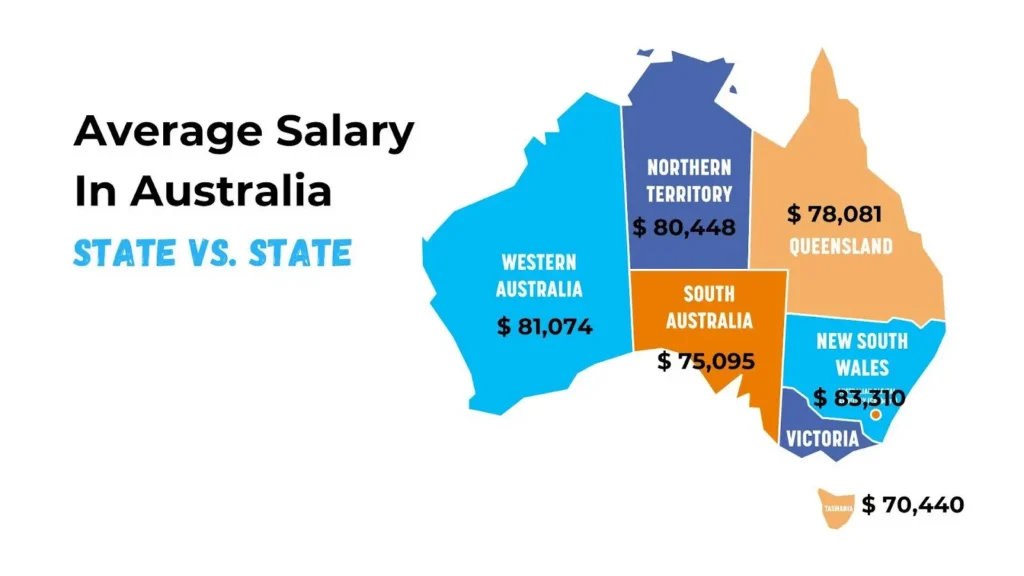
The country’s diverse and welcoming culture, high standards of living, and emphasis on outdoor activities add to its appeal. While the cost of living can be high, it is offset by high salaries, making Australia a desirable destination for both residents and immigrants seeking a high quality of life.
Vibrant Multicultural Society in Australia
According to the 2021 Census, over half of Australians are either born overseas or have a parent born abroad, with people from more than 200 birthplaces calling Australia home. This diversity is reflected in the over 200 languages spoken, including Mandarin, Arabic, Vietnamese, and various Aboriginal and Torres Strait Islander languages.
Religion is significant too, with major faiths like Christianity, Islam, Hinduism, Buddhism, and Judaism practiced across the country. The Australian Bureau of Statistics (ABS) takes a broad approach to understanding ethnicity, considering shared history, cultural traditions, and language. Also, The Census collects data on ancestry, country of birth, English proficiency, language spoken, Indigenous status, and religious affiliation. Over 75% of Australians identify with an ancestry other than Australian, showcasing the nation’s dynamic demographic.
Australia’s multiculturalism brings many benefits, including economic growth, innovation, and global connections. Social cohesion is supported through inclusive policies and cultural celebrations, promoting mutual respect and a sense of belonging. The arts, gastronomy, and festivals thrive on this diversity, offering a rich cultural experience, making Australia a work destination of choice for many.
Opportunity for Skill Development and Career Growth
Australia offers a unique blend of study and work opportunities through its working visas, allowing individuals to pursue short courses to enhance their professional backgrounds. With over 1,200 educational institutions and 20,000 course options, Australia stands as a hub for skill enhancement and career growth. One notable initiative is the Recognition of Prior Learning (RPL) program. This program enables individuals to leverage their existing skills and experiences to gain formal qualifications, enhancing employability and boosting career advancement in a competitive job market.
The Labor Government has committed to significant investments in the Vocational Education and Training (VET) sector. The 2024-25 Budget includes approximately $600 million for skills development in clean energy, construction, and manufacturing sectors. These investments aim to support apprentices, reduce barriers for women in male-dominated industries, and provide financial support for businesses hiring apprentices.
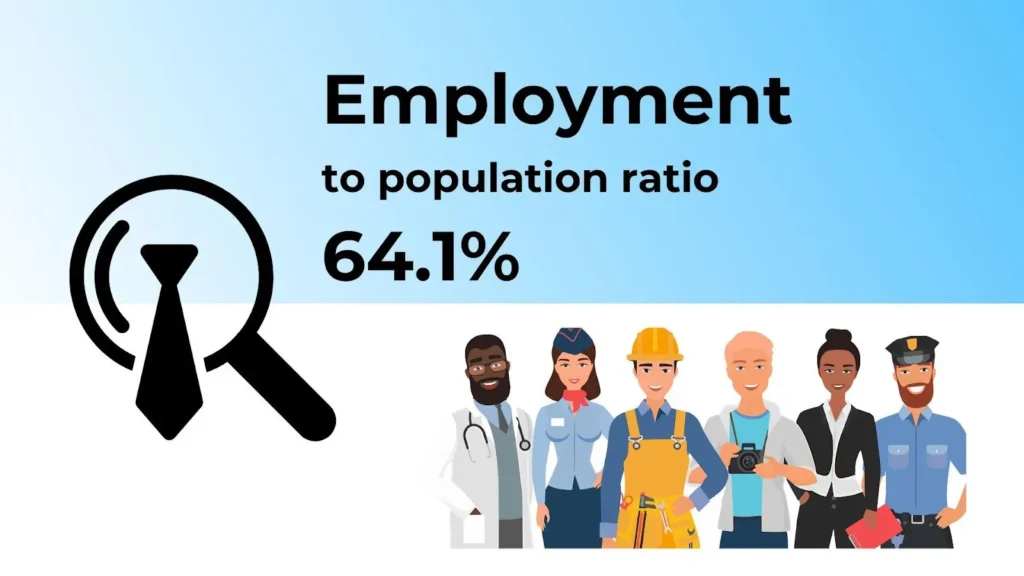
The Australian job market is rapidly evolving, with a growing emphasis on both technical and soft skills. Upskilling and reskilling have become crucial as employers recognise the importance of continuous learning. Industry-university collaborations ensure graduates have practical skills tailored to market demands, while VET programs offer hands-on learning experiences. Short courses provide targeted skill enhancement in areas such as epilepsy management, PEG feeding, business planning, and customer service. These courses quickly equip individuals with the skills needed to excel, creating a dynamic and responsive workforce in Australia as a work destination.
Work Environment
Work-Life Balance in Australia
New research by Humanforce reveals that nearly half of the 500 surveyed Australian workers switched jobs in the past year. Despite rising living costs, 54% prioritised better work-life balance and wellbeing over higher pay. The survey also found that 98% of respondents considered the overall employee value proposition (EVP) crucial in their decision to change employers. Employees now value work-life balance initiatives and career growth opportunities more than financial benefits.
It has significantly impacted employment opportunities in Australia. When employees have time for personal activities, they return to work refreshed and ready to tackle tasks. They take fewer sick days, bring more energy to their tasks, and remain with the company longer. Big companies like Google and Deloitte have seen soaring productivity levels after investing in work-life balance initiatives, demonstrating that these efforts can transform productivity by enhancing Australian work culture and employee mindset.
Employee Well-being in Australia
Living and working in Australia comes with the benefit of strong employee protection laws. Australia is introducing a new law giving employees the “right to disconnect,” meaning they don’t need to monitor email or messages after normal working hours. This law protects employees from unreasonable contact from managers outside of work, which is a particularly attractive place for work in Australia for foreign nationals.
Additionally, With record-low unemployment in Australia, businesses are offering more than just compensation and benefits to attract and retain employees.Companies are rethinking how work is done to deliver both effectiveness and joy for employees, addressing strained workplace relationships and contributing to positive job prospects in Australia for internationals.
Leading companies have implemented wellness programs that significantly decreased staff turnover by adopting a holistic approach to employee well-being. These programs include health screenings, fitness challenges, mental health days, and flexible working arrangements. These programs and their implementation helped the employees to enhance their connection with the company, reduce turnover, and propels organisations forward. This focus on well-being is a key factor in the appeal of Australia as a work destination for skilled workers and contributes to the growing interest in Australia skilled migration.
Supportive Immigration Policies
Australia offers various work visa options for international workers, ranging from temporary to permanent, and catering to both experienced professionals and fresh graduates. Here’s a streamlined guide to these visa categories:
Temporary Work Visas (No Professional Experience Required)
These visas are ideal for recent graduates and do not require prior professional work experience.
- Working Holiday Maker Program: This includes the Work and Holiday Visa (subclass 462) and the Working Holiday Visa (subclass 417), which allow young adults from eligible countries to work and travel in Australia.
- Training Visa (subclass 407): This visa is for those participating in workplace-based training or professional development programs in Australia.
- Temporary Graduate Visa (subclass 485): Designed for international graduates from Australian institutions, this visa allows them to stay and work temporarily post-graduation.
- Temporary Work (International Relations) Visa (subclass 403): For workers involved in activities promoting international relations.
- Temporary Activity Visa (subclass 408): This visa permits temporary entry for specific activities, such as participating in cultural or social events, sports, or religious activities.
Temporary Work Visas (Professional Experience Required)
These visas require prior professional work experience and are suitable for experienced professionals.
- Temporary Skill Shortage Visa (subclass 482): Allows skilled workers to be sponsored by an Australian employer for up to four years.
- Skilled Employer Sponsored Regional (Provisional) Visa (subclass 494): For skilled workers sponsored by employers in regional Australia, valid for up to five years.
- Skilled Work Regional (Provisional) Visa (subclass 491): A point-based visa for skilled workers nominated by a state or territory, allowing work in regional areas for up to five years.
Permanent Work Visas
These visas offer a pathway to permanent residency and require at least two to three years of professional experience.
- Employer Nomination Scheme (subclass 186): For skilled workers nominated by their employers, offering a direct path to permanent residency.
- Permanent Residence (Skilled Regional) Visa (subclass 191): For holders of 494 or 491 visas who have lived and worked in regional Australia for at least three years.
- Skilled Independent Visa (subclass 189): A points-based visa for skilled workers not sponsored by an employer or family member, providing direct permanent residency.
- Skilled Nominated Visa (subclass 190): A points-based visa for skilled workers nominated by an Australian state or territory, offering direct permanent residency.
There are countless reasons why working in Australia is a fantastic choice. Great pay, abundant job opportunities, a fantastic environment, stunning nature, and some of the best cities in the world make Australia an ideal destination for professionals seeking growth and adventure.
Getting proper guidance on employment opportunities in Australia can be challenging, but don’t miss out on these benefits. We’re here to help you. At Global Talent Connect, we assist professionals from around the world in building their careers in Australia through skilled migration. We address Australia’s current skill shortages, especially in technology, healthcare, and engineering, where 36% of jobs faced shortages in 2023.
Our tailored recruitment and migration services cover fields like IT, digital sectors, social work, aged care, education, engineering, and automotive. Global Talent Connect help you find temporary or permanent positions, ensuring a smooth transition into the Australian job market. We are committed to making the recruitment process and integration into the Australian work culture and lifestyle as smooth as possible.
Book your consultation with us today, and let our specialists at Global Talent Connect help you explore your employment and visa options.

